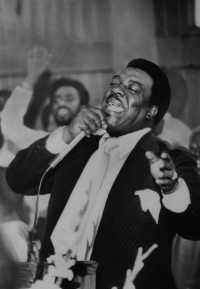The Reverend Dr. James Cleveland (December 5, 1931 - February 9, 1991) was a gospel singer, arranger, composer and, most significantly, the driving force behind the creation of the modern gospel sound, bringing the stylistic daring of hard gospel and jazz and pop music influences to arrangements for mass choirs. He is known as the King of Gospel music.Contents [hide] 1 Biography 1.1 Early life and career 2 Musical career 2.1 Work with The Gospelaires 2.2 The Caravans 2.3 The Angelic Choir 2.4 The Love of God 2.5 Gospel Workshop of America 3 Musical style 4 Death and controversy 5 Awards 6 References 7 External links
[edit] Biography [edit] Early life and career
Born in Chicago, he began singing as a boy soprano at Pilgrim Baptist Church, where Thomas A. Dorsey was minister of music and Roberta Martin was pianist for the choir. He strained his vocal cords as a teenager while part of a local gospel group, leaving the distinctive gravelly voice that was his hallmark in his later years. The change in his voice led him to focus on his skills as a pianist and later as a composer and arranger. For his pioneering accomplishments and contributions, he is regarded by many to be one of the greatest gospel singers to ever live.[1] [edit] Musical career [edit] Work with The Gospelaires
In 1950, Cleveland joined the Gospelaires, a trio led by Norsalus McKissick and Bessie Folk, who were associated with Martin. Martin hired him as a composer and arranger after the group disbanded. His arrangements of songs such as "(Give Me That) Old Time Religion" and "It's Me O Lord" transformed them, giving a rocking lilt and insistent drive to old standards. [edit] The Caravans
Cleveland subsequently went to work for Albertina Walker (Queen Of Gospel Music) and the Caravans as a composer, arranger, pianist and occasional singer/narrator. In November 1954, Albertina Walker provided him the opportunity to do his very first recording. By staying out of the studio for a while, she convinced States Records to allow him to record with her group. He continued to record with The Caravans until States closed down in 1957.[2] He left and returned to the Caravans a number of times to join other groups, such as the Gospel All-Stars and the Gospel Chimes, where he mixed pop ballad influences with traditional shouting. In 1959 he recorded a version of Ray Charles' hit "Hallelujah I Love Her So" as a solo artist. [edit] The Angelic Choir
Cleveland signed with Savoy Records and recorded albums with the group The Angelic Choir, including his critically acclaimed 1962 debut album Peace Be Still. [edit] The Love of God
He became known by more than just the professionals within gospel music with his version of the Soul Stirrers' song, "The Love of God", backed by the Voices of Tabernacle from Detroit. Cleveland attained even greater popularity working with keyboardist Billy Preston and the Angelic Choir of Nutley, New Jersey; his recording of "Peace Be Still", an obscure 18th century madrigal, sold hundreds of thousands of copies thanks to Cleveland's comforting growl and emotional command. [edit] Gospel Workshop of America
Cleveland capitalized on his success by founding his own choir, the Southern California Community Choir, as well as a church that went from a handful of congregants to thousands of members during his life. His influence stretched even further: like Dorsey before him, he taught others how to achieve the modern gospel sound through his annual Gospel Singers Workshop Convention, put on by the Gospel Music Workshop of America ("GMWA"), an organization that Cleveland founded along with Albertina Walker, and which has over 30,000 members in 150 chapters. The GMWA has produced, among others, John P. Kee. [edit] Musical style
The style he pioneered — large disciplined organizations who used complex arrangements and unusual time signatures to turn their massive vocal power to achieve the propulsive rhythms, intricate harmonies and individual virtuosity of the greatest groups of gospel's Golden Age — was still the wellspring for the mass choirs of that era.[3][4] [edit] Death and controversy
Cleveland died in 1991 in Culver City, California.[5] Though his death is often recognized euphemistically as having been a result of heart failure, there has been an enduring controversy as to whether or not Cleveland actually succumbed to AIDS-related complications. Interred at Inglewood Park Cemetery, Inglewood California.[6][7][8][9] Neither are widely discussed within the gospel music community.[10] [edit] Awards Grammy Award won for Best Gospel Album by a Choir or Chorus 1990: The Southern California Community Choir: Having Church Grammy Award won for Best Soul Gospel Performance, Traditional 1980: James Cleveland & The Charles Fold Singers: Lord, Let Me Be an Instrument Grammy Award won for Best Soul Gospel Performance, Traditional 1977: James Cleveland: James Cleveland Live at Carnegie Hall Grammy Award won for Best Soul Gospel Performance 1974: James Cleveland & The Southern California Community Choir: In the Ghetto
